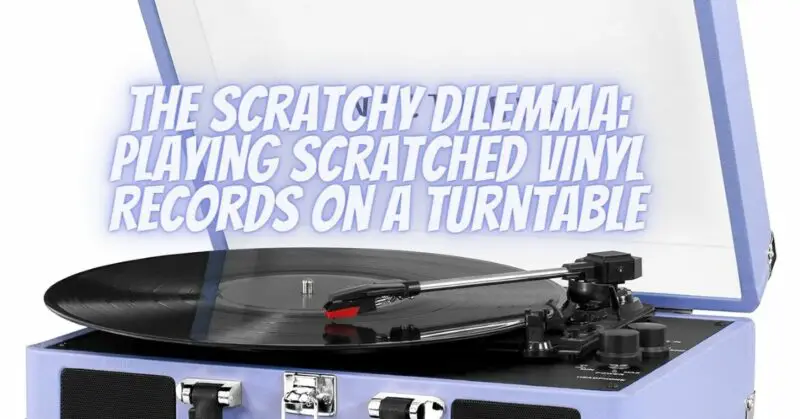Vinyl records have been treasured for decades as a medium that delivers a unique and nostalgic listening experience. However, they are not impervious to wear and tear, and scratches are one of the most common forms of damage that can affect both the aesthetics and sound quality of these beloved analog treasures. Playing a scratched vinyl record on a turntable can lead to a range of outcomes, impacting both the audio quality and the condition of the stylus and record itself.
Understanding Scratches on Vinyl Records
Scratches on vinyl records can vary in severity. They can be minor surface scratches that might not significantly affect playback, or they can be deeper gouges that can cause noticeable disruptions in sound. Regardless of their depth, all scratches have the potential to affect the interaction between the stylus (needle) and the grooves on the record’s surface.
Impact on Sound Quality
When a stylus encounters a scratch on a vinyl record, several sound-related consequences can occur:
- Clicks and Pops: Minor scratches often result in audible clicks, pops, and crackling sounds. These audio artifacts can be distracting and disrupt the listener’s experience.
- Skips and Jumps: Deeper scratches can cause the stylus to skip or jump across the grooves, causing the playback to repeat a section or skip to a different part of the track.
- Distorted Audio: Scratches can lead to distorted or muffled audio, altering the original sound as intended by the artist and producer.
- Tracking Issues: The stylus may struggle to accurately track the groove due to uneven surfaces caused by scratches. This can lead to tracking errors and further exacerbate the negative impact on sound quality.
Mechanical Impact on Equipment
Playing scratched vinyl records can also have mechanical consequences for both the stylus and the turntable:
- Stylus Wear: The stylus’s delicate tip can be damaged by contact with scratches, leading to accelerated wear and reduced lifespan.
- Tracking Force: Deeper scratches may cause the stylus to encounter increased resistance, potentially affecting the tracking force and leading to uneven wear on the stylus.
- Turntable Mechanism: The mechanical components of the turntable, including the tonearm and cartridge, can be stressed when attempting to navigate scratches. This stress can impact the overall longevity of the turntable.
Minimizing Damage and Maximizing Playback
While playing a scratched vinyl record might not yield the optimal listening experience, there are steps you can take to mitigate the negative effects:
- Inspect Records: Before playing a record, visually inspect it for scratches. Light surface scratches might have minimal impact, but deeper scratches should be approached with caution.
- Clean Records: Clean the record’s surface using appropriate cleaning methods and tools. A clean surface can reduce the likelihood of further damaging the stylus.
- Adjust Tracking Force: If your turntable allows it, adjust the tracking force to minimize the impact of scratches on stylus wear.
- Use a Stylus Guard: Consider using a stylus guard or protector to prevent the stylus from coming into direct contact with deep scratches.
- Digitize the Record: If the vinyl is particularly valuable or sentimental, consider digitizing the audio to preserve its content while minimizing wear on the record itself.
In conclusion, playing a scratched vinyl record on a turntable can have a range of effects on sound quality and equipment. While some minor scratches might not be catastrophic, deeper ones can lead to audible distortions, skips, and potential damage to the stylus and turntable components. Careful handling, inspection, and proper maintenance can help mitigate the negative impact of scratches and allow you to enjoy your vinyl collection to the fullest.


